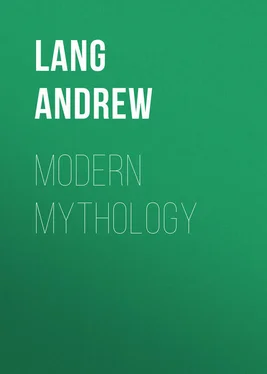Andrew Lang - Modern Mythology
Здесь есть возможность читать онлайн «Andrew Lang - Modern Mythology» — ознакомительный отрывок электронной книги совершенно бесплатно, а после прочтения отрывка купить полную версию. В некоторых случаях можно слушать аудио, скачать через торрент в формате fb2 и присутствует краткое содержание. Жанр: foreign_antique, foreign_prose, на английском языке. Описание произведения, (предисловие) а так же отзывы посетителей доступны на портале библиотеки ЛибКат.
- Название:Modern Mythology
- Автор:
- Жанр:
- Год:неизвестен
- ISBN:нет данных
- Рейтинг книги:4 / 5. Голосов: 1
-
Избранное:Добавить в избранное
- Отзывы:
-
Ваша оценка:
- 80
- 1
- 2
- 3
- 4
- 5
Modern Mythology: краткое содержание, описание и аннотация
Предлагаем к чтению аннотацию, описание, краткое содержание или предисловие (зависит от того, что написал сам автор книги «Modern Mythology»). Если вы не нашли необходимую информацию о книге — напишите в комментариях, мы постараемся отыскать её.
Modern Mythology — читать онлайн ознакомительный отрывок
Ниже представлен текст книги, разбитый по страницам. Система сохранения места последней прочитанной страницы, позволяет с удобством читать онлайн бесплатно книгу «Modern Mythology», без необходимости каждый раз заново искать на чём Вы остановились. Поставьте закладку, и сможете в любой момент перейти на страницу, на которой закончили чтение.
Интервал:
Закладка:
Did they really appear? Were the myths, say the myths of Daphne, really solar? That is precisely what we hesitate to accept. In the same way Mannhardt’s preoccupation with vegetable myths has tended, I think, to make many of his followers ascribe vegetable origins to myths and gods, where the real origin is perhaps for ever lost. The corn-spirit starts up in most unexpected places. Mr. Frazer, Mannhardt’s disciple, is very severe on solar theories of Osiris, and connects that god with the corn-spirit. But Mannhardt did not go so far. Mannhardt thought that the myth of Osiris was solar. To my thinking, these resolutions of myths into this or that original source – solar, nocturnal, vegetable, or what not – are often very perilous. A myth so extremely composite as that of Osiris must be a stream flowing from many springs, and, as in the case of certain rivers, it is difficult or impossible to say which is the real fountain-head.
One would respectfully recommend to young mythologists great reserve in their hypotheses of origins. All this, of course, is the familiar thought of writers like Mr. Frazer and Mr. Farnell, but a tendency to seek for exclusively vegetable origins of gods is to be observed in some of the most recent speculations. I well know that I myself am apt to press a theory of totems too far, and in the following pages I suggest reserves, limitations, and alternative hypotheses. Il y a serpent et serpent ; a snake tribe may be a local tribe named from the Snake River, not a totem kindred. The history of mythology is the history of rash, premature, and exclusive theories. We are only beginning to learn caution. Even the prevalent anthropological theory of the ghost-origin of religion might, I think, be advanced with caution (as Mr. Jevons argues on other grounds) till we know a little more about ghosts and a great deal more about psychology. We are too apt to argue as if the psychical condition of the earliest men were exactly like our own; while we are just beginning to learn, from Prof. William James, that about even our own psychical condition we are only now realising our exhaustive ignorance. How often we men have thought certain problems settled for good! How often we have been compelled humbly to return to our studies! Philological comparative mythology seemed securely seated for a generation. Her throne is tottering:
Our little systems have their day,
They have their day and cease to be,
They are but broken lights from Thee,
And Thou, we trust, art more than they.
But we need not hate each other for the sake of our little systems, like the grammarian who damned his rival’s soul for his ‘theory of the irregular verbs.’ Nothing, I hope, is said here inconsistent with the highest esteem for Mr. Max Müller’s vast erudition, his enviable style, his unequalled contributions to scholarship, and his awakening of that interest in mythological science without which his adversaries would probably never have existed.
Most of Chapter XII. appeared in the ‘Contemporary Review,’ and most of Chapter XIII. in the ‘Princeton Review.’
REGENT MYTHOLOGY
Between 1860 and 1880, roughly speaking, English people interested in early myths and religions found the mythological theories of Professor Max Müller in possession of the field. These brilliant and attractive theories, taking them in the widest sense, were not, of course, peculiar to the Right Hon. Professor. In France, in Germany, in America, in Italy, many scholars agreed in his opinion that the science of language is the most potent spell for opening the secret chamber of mythology. But while these scholars worked on the same general principle as Mr. Max Müller, while they subjected the names of mythical beings – Zeus, Helen, Achilles, Athênê – to philological analysis, and then explained the stories of gods and heroes by their interpretations of the meanings of their names, they arrived at all sorts of discordant results. Where Mr. Max Müller found a myth of the Sun or of the Dawn, these scholars were apt to see a myth of the wind, of the lightning, of the thunder-cloud, of the crépuscule , of the upper air, of what each of them pleased. But these ideas – the ideas of Kuhn, Welcker, Curtius (when he appeared in the discussion), of Schwartz, of Lauer, of Bréal, of many others – were very little known – if known at all – to the English public. Captivated by the graces of Mr. Max Müller’s manner, and by a style so pellucid that it accredited a logic perhaps not so clear, the public hardly knew of the divisions in the philological camp. They were unaware that, as Mannhardt says, the philological school had won ‘few sure gains,’ and had discredited their method by a ‘muster-roll of variegated’ and discrepant ‘hypotheses.’
Now, in all sciences there are differences of opinion about details. In comparative mythology there was, with rare exceptions, no agreement at all about results beyond this point; Greek and Sanskrit, German and Slavonic myths were, in the immense majority of instances, to be regarded as mirror-pictures on earth, of celestial and meteorological phenomena. Thus even the story of the Earth Goddess, the Harvest Goddess, Demeter, was usually explained as a reflection in myth of one or another celestial phenomenon – dawn, storm-cloud, or something else according to taste.
Again, Greek or German myths were usually to be interpreted by comparison with myths in the Rig Veda. Their origin was to be ascertained by discovering the Aryan root and original significance of the names of gods and heroes, such as Saranyu – Erinnys, Daphne – Dahanâ, Athene – Ahanâ. The etymology and meaning of such names being ascertained, the origin and sense of the myths in which the names occur should be clear.
Clear it was not. There were, in most cases, as many opinions as to the etymology and meaning of each name and myth, as there were philologists engaged in the study. Mannhardt, who began, in 1858, as a member of the philological school, in his last public utterance (1877) described the method and results, including his own work of 1858, as ‘mainly failures.’
But, long ere that, the English cultivated public had, most naturally, accepted Mr. Max Müller as the representative of the school which then held the field in comparative mythology. His German and other foreign brethren, with their discrepant results, were only known to the general, in England (I am not speaking of English scholars), by the references to them in the Oxford professor’s own works. His theories were made part of the education of children, and found their way into a kind of popular primers.
For these reasons, anyone in England who was daring enough to doubt, or to deny, the validity of the philological system of mythology in general was obliged to choose Mr. Max Müller as his adversary. He must strike, as it were, the shield of no Hospitaler of unsteady seat, but that of the Templar himself. And this is the cause of what seems to puzzle Mr. Max Müller, namely the attacks on his system and his results in particular. An English critic, writing for English readers, had to do with the scholar who chiefly represented the philological school of mythology in the eyes of England.
Like other inquiring undergraduates in the sixties, I read such works on mythology as Mr. Max Müller had then given to the world; I read them with interest, but without conviction. The argument, the logic, seemed to evade one; it was purely, with me, a question of logic, for I was of course prepared to accept all of Mr. Max Müller’s dicta on questions of etymologies. Even now I never venture to impugn them, only, as I observe that other scholars very frequently differ, toto cælo , from him and from each other in essential questions, I preserve a just balance of doubt; I wait till these gentlemen shall be at one among themselves.
Читать дальшеИнтервал:
Закладка:
Похожие книги на «Modern Mythology»
Представляем Вашему вниманию похожие книги на «Modern Mythology» списком для выбора. Мы отобрали схожую по названию и смыслу литературу в надежде предоставить читателям больше вариантов отыскать новые, интересные, ещё непрочитанные произведения.
Обсуждение, отзывы о книге «Modern Mythology» и просто собственные мнения читателей. Оставьте ваши комментарии, напишите, что Вы думаете о произведении, его смысле или главных героях. Укажите что конкретно понравилось, а что нет, и почему Вы так считаете.












